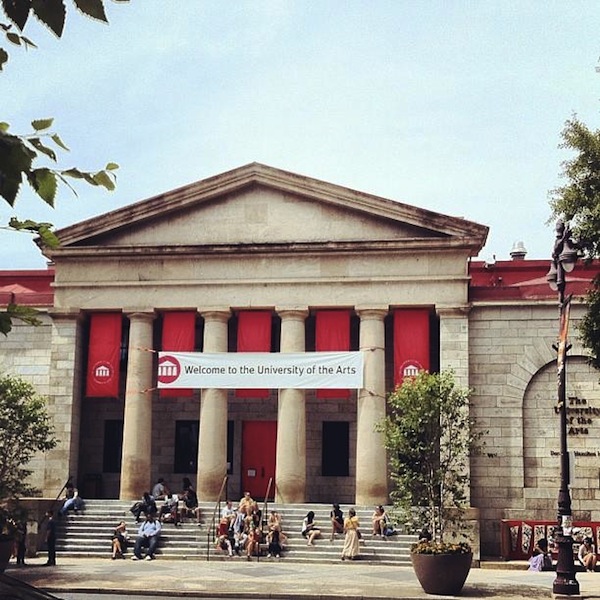
Winner Profile: University of the Arts’ Neil Kleinman on developing a “creative root system” for up-and-coming businesses
In order to promote economic stability for the city’s up-and-coming cultural community, Philadelphia’s University of the Arts strives to not only support its graduates, but also the community at large. The Creative Incubator program — for which UArts won a $120,000 grant in the second year of the Knight Arts Challenge Philadelphia— already provides pre-seed funding, mentorship programs and workshops to students. The Knight funding will expand current programming to accommodate burgeoning creative businesses, providing access to workshops on business and entrepreneurship not normally available to the artistic community. Classes will help new companies develop business plans, offer free advice on strategies, marketing, legal questions and business critiques.We caught up with Neil Kleinman, managing senior fellow of the Corzo Center for the Creative Economy at the University of the Arts, to learn more about the Creative Incubator project and find out why UArts decided to apply to the challenge. (Hint: It was a no-brainer.) University of the Arts’ Knight-funded Creative Incubator program will provide pre-seed funding, mentorship programs and workshops to burgeoning creative businesses in Philadelphia.
Knight Arts Challenge Philadelphia: Why did you apply for a Knight Arts Challenge grant? Neil Kleinman: The application process itself was so easy that it would have been foolish not to apply. The trigger for applying, though, was the sense of urgency we here at UArts have about maintaining the long-term vitality of the creative community. We’ve got a growing, exciting creative community — new theater, dance, art, music and media — but often the members of the community do not have the knowledge required to sustain themselves. The economy is poor for all of us, but especially for young creatives starting new groups. The donor base is narrow and increasingly dedicated to funding the too-big-to-fail large cultural institutions. And, sadly, many creatives graduate from college with significant debt, genuine talent, but no economic savvy to develop sustainable creative-based enterprises. It seemed to us that we must find a way to develop sustainability in the emerging new creative groups — otherwise we wouldn’t have the creative root system we’ll need in the years ahead.
KACP: Your Knight funding will extend the capacity of the Creative Incubator. How did you come up with the idea for this program? NK: Initially we started the UArts Creative Incubator as a laboratory in which students with ideas could continue to develop their creative ideas, learn to make connections between making art and making businesses, and develop entrepreneurial skills they don’t have a chance to learn in their studio classes. We’ve had growing success with our Creative Incubator program, which includes providing pre-seed funding, mentorship, business and legal advice, marketing strategies and other forms of support. With this experience we decided this was a good time to move beyond UArts to other art-based colleges to help them provide their students with the same kind of experience we offer here at UArts, one that allows them to apply what they create and make so they are not dependent on grants or donations and, even if they are nonprofit, so they’ll know how to build an organization that is economically stable. The most important part of what we’ve tried to do is to empower artists, performers, media makers and designers so they understand the value of what they can do and make in order to help them shape their economic future. It seemed to us that that was a responsibility we all have, especially if we want to have the kind of creative community and cultural richness that makes Philadelphia a great city.KACP: What types of projects will be supported through the Creative Incubator? NK: Thus far, we have funded startup theater and video companies; experiments with “green” technologies; programs for children with autism, for adults wanting to develop their art skills, and for artists looking for new connections in the marketplace; a line of jewelry for cancer patients, families and survivors; and a variety of new applications of art and technology. As these projects illustrate, there is truly no limit to the types of projects we can and will fund. We hope to have more in the performing arts and also more in the fine arts. The only constraints will be that the projects we support must not only be based on the creative imagination and skills of the applicants but they must be designed to be sustainable, and we ask applicants to be willing to think about the way in which they will continue after our grant runs out.
KACP: You work directly with innovators who have great ideas for the arts in Philadelphia. What’s your advice to those thinking about applying to year three of the challenge? NK: Think about how the project you propose can survive and grow after the Knight money ends; how the Knight funds will help you establish new partnerships and relationships with groups you can work with in the years ahead. Perhaps above all, think about how what you propose does more than simply “celebrate” what you do — good and exciting as it may be: How does it develop new audiences for your work and the work of others like you; how does it bring a new generation to art and creativity; and how does it develop a bridge between art as an expressive form and art as a community and economic builder?
Applications for year three of the Knight Arts Challenge Philadelphia are now being accepted through Oct. 15. Give us your best idea and make this your year!
Recent Content
-
Artsarticle ·
-
Artsarticle ·
-
Artsarticle ·

